
Danny Beckley / Photo by Randall Baughn
The continued health of the arts in Kansas City has long been uppermost in our collective consciousness, and for months COVID-19 has kept us all preoccupied. Meanwhile, what is perhaps the most significant decision of the decade for our cultural future is already underway. Yet it has almost escaped notice.
During the past 20 years the Kansas City Symphony’s prestige has grown enormously, with expanded activities that have driven a modest $8 million budget to one of nearly $20 million. Under determined leadership it has made significant strides toward becoming a national player, and its rise has exerted impact on the Kansas City Ballet and the Lyric Opera, both of which it serves with distinction.
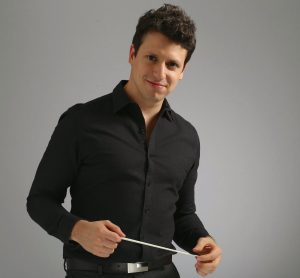
Paolo Bortolameolli
Thus the search for a successor to Michael Stern, who announced last year that he would step down from the music directorship at the end of the 2022-2023 season, has become of utmost importance: A new music director for the Symphony has the potential of shaping our city’s arts scene for at least the next half-century, and it is important for us to know how this is going to work and what sort of input we can all have.
Front-and-center in this process is Danny Beckley, the Symphony’s executive director as of July 2019, who will steer the orchestra, its board, and a search committee through one of the most difficult processes an orchestra faces. “Music director searches are major inflection points in organizations, in orchestras,” said Danny, who previously served orchestras in Indianapolis and Charleston, South Carolina. “Because every music director comes in with a different vision for the sound of the orchestra.”
Michael’s success in building a regional orchestra into a national institution will allow Symphony leadership to hand over a group that is ready for next-level growth.
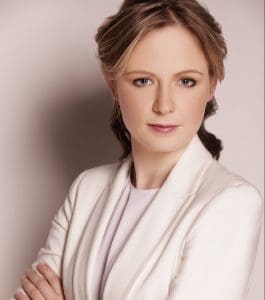
Gemma New / Photo by Roy Cox
“This is a young organization,” Danny said, “and since 1982 it’s gone from basically zero to being one of the top 30 orchestras in the country, by budget size. The opportunity for us to take that momentum, and combined with the new Helzberg Hall, combined with a music-director shift, is a tremendously exciting thing: a time for this orchestra to become a national leader artistically, and to build a ‘Kansas City Symphony sound,’ just like other major orchestras.”
Danny compares Kansas City to Cleveland, whose orchestra came to prominence after its more prestigious cousins in New York, Philadelphia, Chicago, and Boston, but which now stands alongside them in what the industry has come to call the Big Five. “When you listen to the Cleveland Orchestra, and you know you are listening to Cleveland,” he said. “You listen to the Chicago Symphony, and you know you’re listening to Chicago. I think we can achieve that with the next music director.”
As a professionally trained musician, Danny is in a position to know. Growing up in the Tidewater area of southeastern Virginia, he fell in love with the trombone and yearned to follow in the footsteps of his father, a jazz trombonist. “I had a really great band director in high school, Tom Emory, who told me, Danny, if you want to be a jazz musician you first need to study classical. Establish your classical chops and then you can move into jazz. And that’s exactly what I did. I just forgot to go back to jazz.”
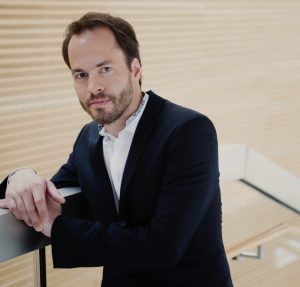
Johannes Debus / Photo by Bo Huang
Danny would go on to earn a bachelor’s degree from James Madison University and a master’s in music performance from Northwestern University. At one point he had a fairly lucrative career at a Charleston-based web-design firm, but he could not shake the orchestral bug.
His dual passions for music and innovation led him toward the administrative side of music, which he admitted is not always the most glamorous part of the industry.
“It’s a personal calling,” he said, “and I still feel like this is my purpose. … I have always been an entrepreneurial type of person, and a person who absolutely adores music: You put those two things together and you come up with orchestra management.”
When crises such as the coronavirus arise, it’s best to have a steady hand. “And you’re right, it’s not terribly glamorous: Michael Stern gets all the applause up onstage,” he said. “But I see my job as one of guiding the ship quietly, to steer us through this crisis.”
So how do you go about “interviewing” music director candidates? It’s simple: You invite them to guest-conduct during a Classical Series weekend, “testing the waters” with as wide a variety of musicians as possible. “Every candidate that comes through Kansas City is obviously somebody that we’re looking at,” Danny said. “I think it’s safe to assume that pretty much anybody who’s on the podium right now could be that next music director.”

Michael Francis / Photo by Marco Borggreve
Under the leadership of Pat McCown, the Symphony’s board chairman, the Music Director Search Task Force has already begun meeting. Consisting of Symphony musicians, board and staff members, and one non-board community member, it is “tasked with looking at the full scope of what it means to be a music director, and representing the needs of all the constituents,” Danny said.
“It will have numerous opportunities to see and interact with each candidate, followed by in-depth discussions on each.” (Next season is scheduled to include guest stints by Michael Francis, Paolo Bortolameolli, Gemma New, Christian Reif, and Joshua Weilerstein. The current season’s appearance by Johannes Debus was canceled, but he will no doubt be back. Others are in the wings for upcoming seasons.)
Just as important, the opinions of Symphony musicians and of its audiences will be solicited on a regular basis: These spontaneous reactions often bear surprising weight in the process. “We always poll our audience on our concerts, and these will be no exception,” Danny said. “We also poll the entire orchestra about every conductor that stands before them.”
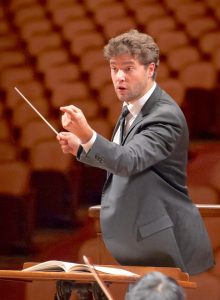
Christian Reif / Photo by Stefan Cohen
While Michael does not play a direct role in the process, his broad knowledge of the conducting field is certainly being called upon. “I value his insights, so I will from time to time solicit his opinions about different conductors that we are considering,” Danny said. But candidates “are selected by the Task Force,” he added, and “although not all guest conductors are necessarily candidates,” most are. The Symphony does not publicly declare any guest an “official” candidate. “A lot of these people already have jobs in communities that adore them,” Danny said. “We want to be respectful.”
The world of conductors “is pretty rich,” Danny said, adding that “the world of music directors is quite a bit smaller. To have that magic balance of leadership capability, an ability to communicate, an ability to conduct and inspire the best from our musicians, is a pretty tall order, and it requires a pretty special person.” What complicates the process further is that Kansas City is “one of more than a dozen orchestras, big orchestras, that are looking for a music director, believe it or not. So the conductors we are bringing in are being looked at by a number of orchestras, not just us.”
Nevertheless, the Kansas City Symphony has much to offer and is thus in a solid position to attract top talent: It is economically stable and consists of a group of nimble, open-minded musicians who are not hidebound by long-standing traditions that sometimes plague larger orchestras.
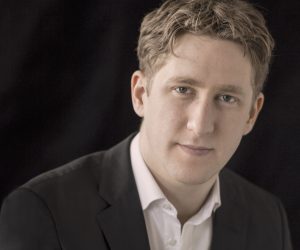
Joshua Weilerstein / Photo Sim Canetty-Clarke
Our city also boasts one of the finest concert spaces in the United States: Since the Kauffman Center opened in 2011 it has seen a flood of world-class musicians clamoring to perform in Helzberg Hall’s intimate acoustic.
“Here you’ve got an entrepreneurial bunch of people, a very young orchestra, and one that is really hungry to grow, to go to that next place,” Danny said. “We don’t know what that is, that’s open-ended. And we’re willing to work with the new music director to find out what that artistic vision is. It’s an incredible artistic opportunity, compounded with our economic stability and the strength of this wonderful community.”
—By Paul Horsley
For up-to-date information about the Symphony’s 2020-2021 season, go to kcsymphony.org. For information about Michael Stern’s current and future endeavors, see his page at colbertartists.com. For an interview we conducted with Michael on these pages in 2013, click here. To reach Paul Horsley, performing arts editor; send an email to paul@kcindependent.com or find him on Facebook (paul.horsley.501) or Twitter (@phorsleycritic).